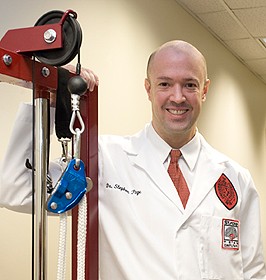
2008 UC|21 President's Excellence Award: Stephen Page
Stephen Page, PhD, and his team at the Neuromotor Recovery and Rehabilitation Laboratory at the Drake Center are part of a small group of health care providers giving renewed hope to stroke survivors.
Only in the past few years have researchers and clinicians begun to realize that the brain can be retrained following stroke, and that function can be re-established. In fact, Pages research group has shown that specific therapies can actually prompt the brain to rewire itself.
His work provides optimism to stroke survivors who once thought recovery stopped after 6 months to a year. And his research has been eye-opening to clinicians and payers, who previously thought that stroke recovery was not possible years after stroke.
Page works daily to pass on what he knows about stroke recoverynot only to patients in the community, but also to clinicians across the country, and to graduate and undergraduate students in medicine, engineering, neuroscience, design, and many allied health professions.
Its because of this, and the many other ways Page has exemplified the goals of UC|21, that he has been named the 2008 Presidents Excellence Award winner.
The region and its Greater Cincinnati/Northern Kentucky Stroke Team has long been a leader in the treatment of the acute phase of stroke. Pages lab complements that effort, adding to it the treatment for the chronic phases of stroke and other neurological diseases.
Page, who serves as an associate professor in both the colleges of allied health sciences and medicine, spends much of his time reaching out to clinicians and patients in the Cincinnati community and across the country. He and his team develop and test therapies to restore movement after stroke, and then examine how the physical changes they observe might be driven by changes in the central nervous system, also called neuroplasticity.
Further action is required to make this image accessible
One of the below criteria must be satisfied:
- Add image alt tag OR
- Mark image as decorative
The image will not display on the live site until the issue above is resolved.
The research Page leads fills a much-needed gap between the amount of therapy allowed by most insurers and the actual time post-stroke that patients can see improvement in function. In fact, his teams work has helped to change the way payers consider and reimburse many therapies after stroke.
The husband of one of Pages patients previously wrote that his wifes work with Page and his team "began 14 years after her stroke, and it seems to have opened the door again. Her right arm and hand are no longer just a sleeve stuffer."
A once-aspiring college swim coach, Page took his interest in exercise physiology and began working with paralympians and others with disabilities. It was this work, Page says, that led him to focus on stroke recovery.
Page credits his many experiences for leading him to be so interested in improving the lives of others, and says his work at UC has given him the opportunity interact with many people in a number of disciplines.
"At the end of a typical day, I may have spoken to a colleague in genetics about an impending project, then someone in neuroimaging," says Page. "I could have also chatted with a subject in one of our therapy regimens, mentored a student, and talked to a support group. I love the variety and the fact that it necessarily occurs at so many levels"
Pages group recently received funding to continue a collaboration with colleagues in industrial design. The group is working on an intervention for people with paralysis in their arms.
According to College of Allied Health Sciences Dean Elizabeth King, PhD, "In his commitment to life-long learning he is a role model to faculty, students and other researchers as they work together to strive to increase their understanding of the complexities within the field of neuroscience."
Page has been described as an extremely student-centered faculty member. In fact, with the Presidents Excellence Award comes a $2,000 monetary award and Page has decided to donate all of it back to the UC Office of Research to support student research initiatives.
But Pages work with students doesnt end at UC. He mentors and conducts research with a student group at Xavier University, where in April, he and a colleague were honored with an award for the clinical mentoring they have provided to students there.
Page has had a prolific research career at UC. Hes obtained several grants from the National Institutes of Health and, in 2005, was one of only a handful of researchers across the country to receive a prestigious Bugher Award from the American Stroke Association. This four-year grant recognizes the best stroke research studies from across the United States. Page was the only rehabilitation researcher honored with this award, and one of only a handful of clinical researchers.
For his research efforts, Page has been named a fellow of the American Stroke Association and he served as chairperson of the 2004 and 2005 joint, annual conferences of the American Congress of Rehabilitation Medicine (ACRM)/American Society of Neurorehabilitationthe worlds largest, interdisciplinary rehabilitation research conference. In 2006, Page received ACRMs first ever Deborah Wilkerson Award, an international prize honoring a promising early career scholar in rehabilitation research.
Related Stories
Dr. Karen Craven honored with Service-Learning award
April 19, 2024
Dr. Karen Craven, assistant professor of occupational therapy in the College of Allied Health Sciences, receives 2024 Jack Twyman Award for Service-Learning.
UC President Neville Pinto shares 2024 State of the University...
April 16, 2024
University of Cincinnati President Neville G. Pinto shared his 2024 Sate of the University address with the campus community on April 15.
Professor receives prestigious 'Texty' award for textbook...
April 15, 2024
The University of Cincinnati's Patricia Tille has played a pivotal role and received a "Texty" award for developing and updating the textbook "Bailey & Scott's Diagnostic Microbiology."
